面试英语:大公司“行为面试”应对技巧
- 格式:docx
- 大小:180.61 KB
- 文档页数:6
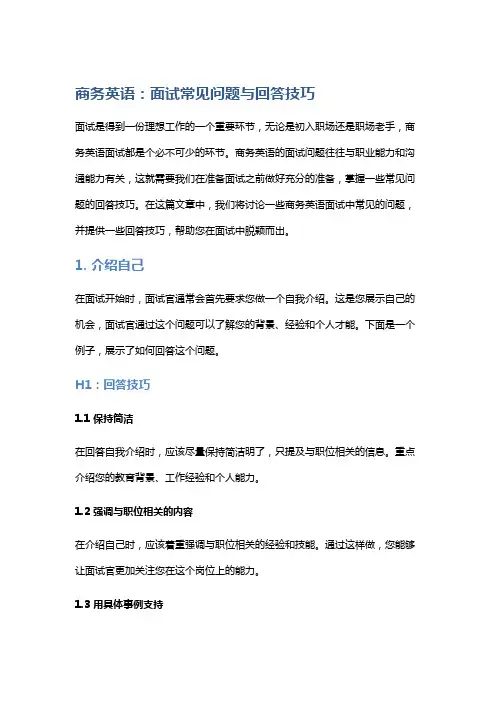
商务英语:面试常见问题与回答技巧面试是得到一份理想工作的一个重要环节,无论是初入职场还是职场老手,商务英语面试都是个必不可少的环节。
商务英语的面试问题往往与职业能力和沟通能力有关,这就需要我们在准备面试之前做好充分的准备,掌握一些常见问题的回答技巧。
在这篇文章中,我们将讨论一些商务英语面试中常见的问题,并提供一些回答技巧,帮助您在面试中脱颖而出。
1. 介绍自己在面试开始时,面试官通常会首先要求您做一个自我介绍。
这是您展示自己的机会,面试官通过这个问题可以了解您的背景、经验和个人才能。
下面是一个例子,展示了如何回答这个问题。
H1:回答技巧1.1 保持简洁在回答自我介绍时,应该尽量保持简洁明了,只提及与职位相关的信息。
重点介绍您的教育背景、工作经验和个人能力。
1.2 强调与职位相关的内容在介绍自己时,应该着重强调与职位相关的经验和技能。
通过这样做,您能够让面试官更加关注您在这个岗位上的能力。
1.3 用具体事例支持在介绍自己的能力和经验时,最好使用具体的事例来支持您的说法。
这样可以让面试官更有信心地相信您所说的话。
1.4 结尾简单明了在自我介绍的结尾,您可以提及一些与职位相关的目标和期望,以及对公司的兴趣和动机。
这样可以让面试官更加了解您的职业发展规划。
2. 为什么你要应聘这个岗位?这是另一个常见的面试问题,通过这个问题,面试官想了解您对这个岗位的看法和动机,以及您对公司的了解。
下面是一个例子,展示了如何回答这个问题。
H1:回答技巧2.1 说明您对职位的了解在回答这个问题时,应该首先表达对所应聘岗位的了解。
通过这样做,您可以向面试官展示您对这个岗位的兴趣和热情。
2.2 强调与职位需求的匹配在回答这个问题时,您应该强调您的技能和经验与职位需求的匹配程度。
这样可以让面试官相信您是最适合这个岗位的人选。
2.3 表达对公司的兴趣在回答这个问题时,应该表达对这个公司的兴趣。
您可以提及您对该公司的产品、服务或文化的认可,并说明您希望能够为该公司做出贡献。
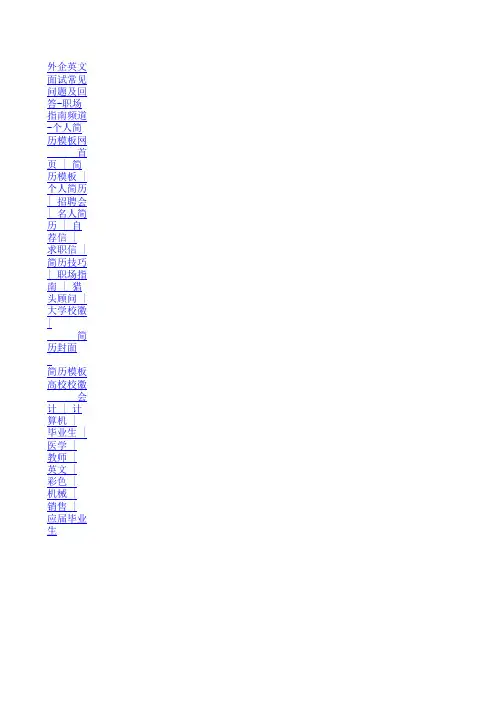
外企英文面试常见问题及回答-职场指南频道-个人简历模板网首页 | 简历模板 | 个人简历 | 招聘会 | 名人简历 | 自荐信 | 求职信 | 简历技巧 | 职场指 简历封面简历模板 高校校徽会计 | 计算机 | 毕业生 | 医学 | 教师 | 英文 | 彩色 | 机械 | 销售 | 应届毕业生软件 | 英文简历 | 文员 | 护士 | 护理 | 出纳 | 自动化 | 日文 | 设计 | 土木工程您现在的位置: 首页 > 职场指南 > 外企英文面试常见问题及回答面试在求职活动过程中,对于求职者而言,可说是压力最大的一个阶段,因为能否成功地达成就 因此,想要在面试中成为胜利的佼佼者的话,唯有做好万全的准备,才能收到事半功倍的机 个人简历模板排行榜:最新简历模板发布排行榜 | 热门简历模板点击排行榜 | 热门简历模板下载 外企英文面试常见问题及回答来源:个人简历模板网 发布时间:2008-11-7 7:49:01 人气:2043 Q:Can you sell yourself in two minutes? Go for it. A:With my qualifications and experience, I feel I am hardworking,responsible and diligent in any project I undertake. Your organization couldbenefit from my analytical and interpersonal skills. Q:Give me a summary of your current job description. A:I have been working as a computer programmer for five years. Tobe specific, I do systemanalysis, trouble shooting and provide softwaresupport. Q:Why did you leave your last job? A:Well, I am hoping to get an offer of a better position. Ifopportunity knocks, I will take it. A:I feel I have reached the "glass ceiling" in my current job. / I feel there is no opportunityfor advancement. Q:How do you rate yourself as a professional? A:With my strong academic background, I am capable and competent. A:With my teaching experience, I am confident that I can relate tostudents very well. Q:What contribution did you make to your current (previous)organization? A:I have finished three new projects, and I am sure I can apply myexperience to this position. Q:What do you think you are worth to us? A:I feel I can make some positive contributions to your company inthe future. Q:What make you think you would be a success in this position? A:My graduate school training combined with my internship should qualify me for this particular job. I am sure I will be successful. Q:Are you a multi-tasked individual?or Do you work well understress or pressure? A:Yes, I think so. A:The trait is needed in my current (or previous) position and I know I can handle it well. Q:What is your strongest trait(s)? A:Helpfulness and caring. A:Adaptability and sense of humor. A:Cheerfulness and friendliness. Q:How would your friends or colleagues describe you? A:(pause a few seconds) They say Mr. Chen is an honest,hardworking and responsible man who deeply cares for his family and friends. A:They say Mr. Chen is a friendly, sensitive, caring anddetermined person. Q:What personality traits do you admire? A:(I admire a person who is)honest, flexible and easy-going. A:(I like) people who possess the "can do" spirit. Q:What leadership qualities did you develop as an administrative personnel? A:I feel that learning how to motivate people and to work together as a team will be the major goal of my leadership. A:I have refined my management style by using an open-door policy. Q:How do you normally handle criticism? A:Silence is golden. Just don't say anything; otherwise thesituation could become worse. I do, however, accept constructive criticism. A:When we cool off, we will discuss it later. Q:What do you find frustrating in a work situation? A:Sometimes, the narrow-minded people make me frustrated. A:Minds that are not receptive to new ideas. Q:How do you handle your conflict with your colleagues in yourwork? A:I will try to present my ideas in a more clear and civilizedmanner in order to get my points across. Q:How do you handle your failure? A:None of us was born "perfect". I am sure I will be given asecond chance to correct my mistake. Q:What provide you with a sense of accomplishment. A:Doing my best job for your company. A:Finishing a project to the best of my ability. Q:If you had a lot of money to donate, where would you donate it to?Why? A:I would donate it to the medical research because I want to do something to help others. A:I prefer to donate it to educational institutions. Q:What is most important in your life right now? A:To get a job in my field is most important to me. A:To secure employment hopefully with your company. Q:What current issues concern you the most? A:The general state of our economy and the impact of China' entry to WTO on our industry. Q:How long would you like to stay with this company? A:I will stay as long as I can continue to learn and to grow in my field. Q:Could you project what you would like to be doing five yearsfrom now? A:As I have some administrative experience in my last job, I may use my organizational and planning skills in the future. A:I hope to demonstrate my ability and talents in my fieldadequately. A:Perhaps, an opportunity at a management position would beexciting. 如果不愿正面回答,也可以说: It would be premature for me to predict this. 甚至还可以打趣的说: Hypothetically speaking, I might be able to do your current job as a director下一个:如何用英文回答跳槽的原因 上一个:外企面试考官最爱提十个问题 热门中文个人简历模板下载毕业生word简历模板个人简历word简历模板28套空白简历模板08新款简历模板2007毕业生空白个人简历模板简单型空白个人简历模板 毕业生简历模板1个人简历word简历模板II有工作经验者word简历模板中英文简历全套word简历模板 毕业生简历模板word简历样本简历模板毕业生简历模板2中英文求职信+word简历毕业生简历模板10超详细word简历表传统型实用简历模板标准简历模板毕业生简历模板3有工作经验者简历模板毕业生简历模板8毕业生简历模板4毕业生简历模板6毕业生简历模板9含装饰图片word简历模板毕业生简历模板5毕业生简历模板[2]超详细word简历表II毕业生简历模板7有工作经验者简历模板[2]毕业生简历模板[3]国际贸易专业简历模板会计员word简历模板毕业生简历模板[4]职场指南阅读排行榜面试技巧101招(7600)外企面试考官最爱提十个问题(5040)面试失败的十个坏习惯(3719)外企英文面试常见问题及回答(2043)外企面试成功五策略(1384)去外企面试必须改掉的陋习(1327)求职中如何应对外企外语口试(1120)面试如何应对十大必考题?(1001)四大中外名企如何面试求职者(923)如何用英文回答跳槽的原因(879)新人求职:精简简历应届毕业生如何写个人简历简历中的超强自我评价语五种有特色的网上个人简历HR教你如何写个人简历个人简历信息建议和文字要求个人简历:突出意向惹人爱个人简历怎样写好自我评价个人简历怎样写好自我评价专家:求职简历有窍门求职:成也简历,败也简历求职简历别用这九句废话面试技巧101招外企面试考官最爱提十个问题外企英文面试常见问题及回答外企面试成功五策略去外企面试必须改掉的陋习求职中如何应对外企外语口试四大中外名企如何面试求职者如何用英文回答跳槽的原因外企英语电话面试应急模拟面试中可能用到的英语对话我在雀巢公司的面试外企面试经历与哲学式的分析南京猎头提醒:想跳槽?10件你要做的事五大因素影响个人薪资职场人士最忌讳的四种跳槽如何巧妙回答离职原因?猎头公司“猎才”三标准如何实施辞职计划?外贸行业四类高级人才最为紧缺猎头最关注的简历关键词猎头公司年薪十万 招应届毕业生猎头最关注的简历关键词猎头业过冬:衰退期正是好时期跳槽:俘获高薪职位的窍门热门Flash迷你小游戏 TOP 15在线键盘打字练习小游戏美女更衣小游戏美女脱衣小游戏黄金矿工小游戏少女脱衣秀小游 美女老虎机小游戏雷电小游戏宠物连连看小游戏宝石消消乐小游戏四川麻将连连看小游戏 是男人就下100层小游戏山地摩托小游戏美女的诱惑小游戏美女化妆小游戏旋风小子小游戏 最新Flash迷你小游戏 TOP 15超眩高空弹跳智者创世纪Ⅰ-迷之殿情人节小子追爱记新上海麻将梭哈扑克老虎机新中国龙珍珠港之战鼠标射击气泡坦克微型战斗飞弹对射任天狗偷骨头-女性小游戏宠物连连看2.5版魔力连连看个人简历封面之金色阶梯个人简历封面之花朵格子个人简历封面之摩登时代个人简历封面模板-突破IT计算机专业的简历封面文章资讯推荐阅读简历技巧就业指导猎头顾问南京猎头告诉你:让招聘考官喜欢的简历简历,百投百中的10大绝招招聘官:人事经理是如何找简历的南京猎头告诉你阻碍HR看你简历的六个原因英文简历中需要注意的5个细节怎样用一个小简历做好求职大文章南京猎头网:危机下的职业人生人事经理个人简历模板危机中求职,咋让简历脱颖而出如何写简历:拆解大卫包装术跳槽怎样才能薪酬翻倍?最具欺骗色彩的职场词汇职场如何运用“蘑菇定律”谈薪不容忽视之细节面试成功必读的技巧与忠告意外面试 考验内心世界技术工作面试十大误区30岁职业人的职场规划心得小组面试:越来越难过的求职关如何在30分钟面试中确定胜势怎样才能跳出职场发展空间紫光电脑总经理姬浩跳槽同方南京猎头:伊莱克斯中国区第七位总裁李艳离职 调查显示四成人不再期望升职加薪南京猎头提醒:想跳槽?10件你要做的事猎头顾问是怎样炼成的著名猎头预测全球就业情况 中国明年初上海最差 重庆第五次赴北京大规模引进人才浙商50万年薪沪上挖角职场人士最忌讳的四种跳槽自荐信求职信名人简历鲁东大学心理与教育学院自荐信DOC数学专业自荐信工程地质专业自荐信市场营销专业自荐信参考国际贸易专业自荐信学前教育教师求职自荐信网络维护工程师求职信体育专业自荐信参考3历史专业自荐信参考热能与动力工程专业自荐信参考7投递求职信小处莫疏忽济南大学生物技术专业毕业生求职信英文求职信(一)英文求职信(二)编辑求职信经理秘书求职信如何提高求职信含金量求职信的规则投递求职信小处莫疏忽外企这样看待求职信韩佳人资料韩佳人档案韩佳人个人简历(图)金泰熙资料金泰熙档案金泰熙个人简历(图)周海媚资料周海媚档案周海媚个人简历(图)江若琳资料江若琳档案江若琳个人简历(图)裴涩琪资料裴涩琪档案裴涩琪个人简历(图)尹恩惠资料尹恩惠档案尹恩惠个人简历(图)蔡妍资料蔡妍档案蔡妍个人简历(图)权相宇资料权相宇档案权相宇个人简历(图)玄彬资料 玄彬档案 玄彬个人简历(图)文根英资料文根英档案文根英个人简历(图)-输入您的搜索字词 提交搜索表单Web 南京人才网 个人简历模板 ©2000 - 2009 南京猎头公司 本站法律顾问:江苏律师 - 南京律师技巧 | 职场指南 | 猎头顾问 | 大学校徽 || 应届毕业生计 | 土木工程因为能否成功地达成就职,全靠这临门一脚。
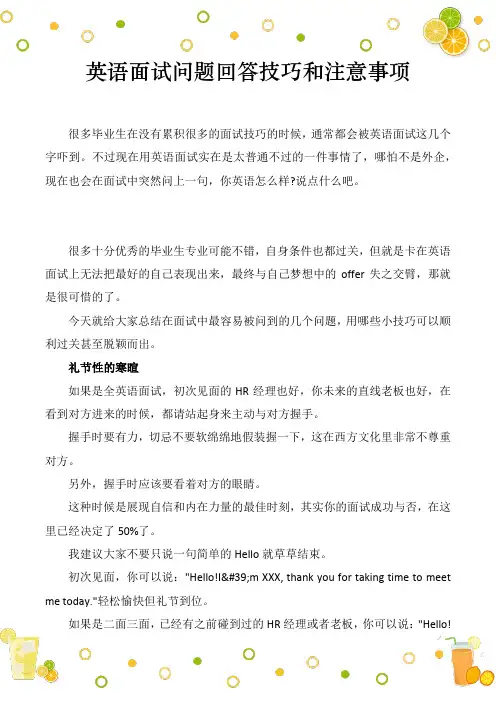
英语面试问题回答技巧和注意事项很多毕业生在没有累积很多的面试技巧的时候,通常都会被英语面试这几个字吓到。
不过现在用英语面试实在是太普通不过的一件事情了,哪怕不是外企,现在也会在面试中突然问上一句,你英语怎么样?说点什么吧。
很多十分优秀的毕业生专业可能不错,自身条件也都过关,但就是卡在英语面试上无法把最好的自己表现出来,最终与自己梦想中的offer失之交臂,那就是很可惜的了。
今天就给大家总结在面试中最容易被问到的几个问题,用哪些小技巧可以顺利过关甚至脱颖而出。
礼节性的寒暄如果是全英语面试,初次见面的HR经理也好,你未来的直线老板也好,在看到对方进来的时候,都请站起身来主动与对方握手。
握手时要有力,切忌不要软绵绵地假装握一下,这在西方文化里非常不尊重对方。
另外,握手时应该要看着对方的眼睛。
这种时候是展现自信和内在力量的最佳时刻,其实你的面试成功与否,在这里已经决定了50%了。
我建议大家不要只说一句简单的Hello就草草结束。
初次见面,你可以说:"Hello!I'm XXX, thank you for taking time to meet me today."轻松愉快但礼节到位。
如果是二面三面,已经有之前碰到过的HR经理或者老板,你可以说:"Hello!Nice seeing you again today!"这种时候比较有礼节的老外会问你How are you或者Everything all right?你可以回答:"I'm well. Thank you. How are you?"不要说些奇怪的什么"so so" 也就是不好不坏,I'm fine也可以说,但其实I'm fine也就是不好不坏的意思,我自己不是很偏向使用。
面试的时候也切忌不要太实诚,别人问你怎么样你就说一大堆最近的困惑,对方可不是心理医生。
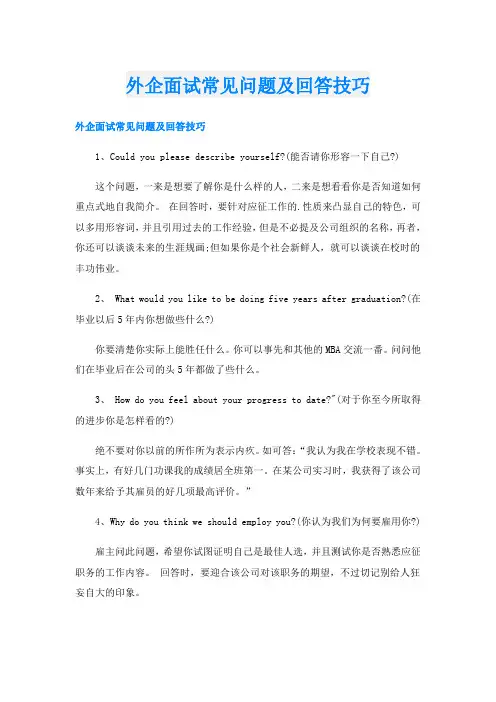
外企面试常见问题及回答技巧外企面试常见问题及回答技巧1、Could you please describe yourself?(能否请你形容一下自己?)这个问题,一来是想要了解你是什么样的人,二来是想看看你是否知道如何重点式地自我简介。
在回答时,要针对应征工作的.性质来凸显自己的特色,可以多用形容词,并且引用过去的工作经验,但是不必提及公司组织的名称,再者,你还可以谈谈未来的生涯规画;但如果你是个社会新鲜人,就可以谈谈在校时的丰功伟业。
2、 What would you like to be doing five years after graduation?(在毕业以后5年内你想做些什么?)你要清楚你实际上能胜任什么。
你可以事先和其他的MBA交流一番。
问问他们在毕业后在公司的头5年都做了些什么。
3、 How do you feel about your progress to date?"(对于你至今所取得的进步你是怎样看的?)绝不要对你以前的所作所为表示内疚。
如可答:“我认为我在学校表现不错。
事实上,有好几门功课我的成绩居全班第一。
在某公司实习时,我获得了该公司数年来给予其雇员的好几项最高评价。
”4、Why do you think we should employ you?(你认为我们为何要雇用你?)雇主问此问题,希望你试图证明自己是最佳人选,并且测试你是否熟悉应征职务的工作内容。
回答时,要迎合该公司对该职务的期望,不过切记别给人狂妄自大的印象。
5、What classes did you like best back in school?(在学校你最喜欢哪门课?)此时,雇主想了解你的学习能力,以及你有兴趣的专业课程是否跟工作扯得上边;此外,个人在求学过程的好恶,会反应在不同的工作岗位上。
回答时,一定要表示自己以好学著称,喜欢学习新知,尤其是与应征工作有关的课程。
6、What do you think are your greatest strengths and weaknesses? (你自认自己最大的优劣势分别为何?)雇主问这样的问题,旨在探知你是否有足够的自我认知,以及你是否是该职务的不二人选。
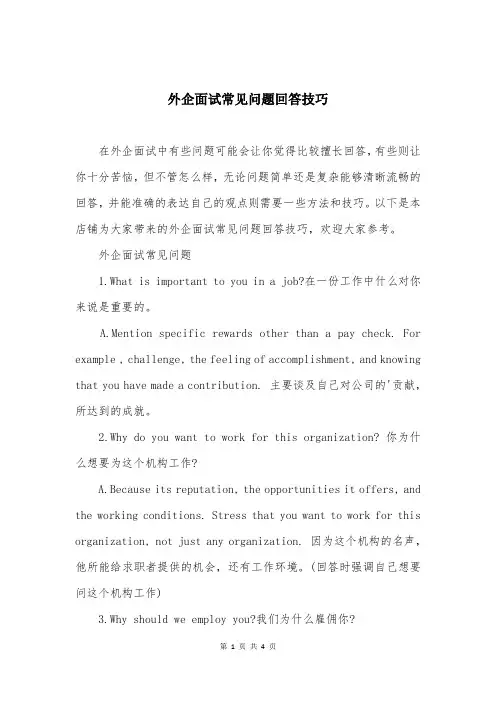
外企面试常见问题回答技巧在外企面试中有些问题可能会让你觉得比较擅长回答,有些则让你十分苦恼,但不管怎么样,无论问题简单还是复杂能够清晰流畅的回答,并能准确的表达自己的观点则需要一些方法和技巧。
以下是本店铺为大家带来的外企面试常见问题回答技巧,欢迎大家参考。
外企面试常见问题1.What is important to you in a job?在一份工作中什么对你来说是重要的。
A.Mention specific rewards other than a pay check. For example , challenge, the feeling of accomplishment, and knowing that you have made a contribution. 主要谈及自己对公司的'贡献,所达到的成就。
2.Why do you want to work for this organization? 你为什么想要为这个机构工作?A.Because its reputation, the opportunities it offers, and the working conditions. Stress that you want to work for this organization, not just any organization. 因为这个机构的名声,他所能给求职者提供的机会,还有工作环境。
(回答时强调自己想要问这个机构工作)3.Why should we employ you?我们为什么雇佣你?A.Point to your academic preparation, job skills, and enthusiasm about working for the firm. Mention your performance in school or previous employment as evidence of your ability to learn and to become productive quickly. If the job involves management responsibilities, refer to pastactivities as proof of your ability to get along with others and to work as part of a team.这里要指出自己的学术成就,专业技能,为这个公司工作的热情。
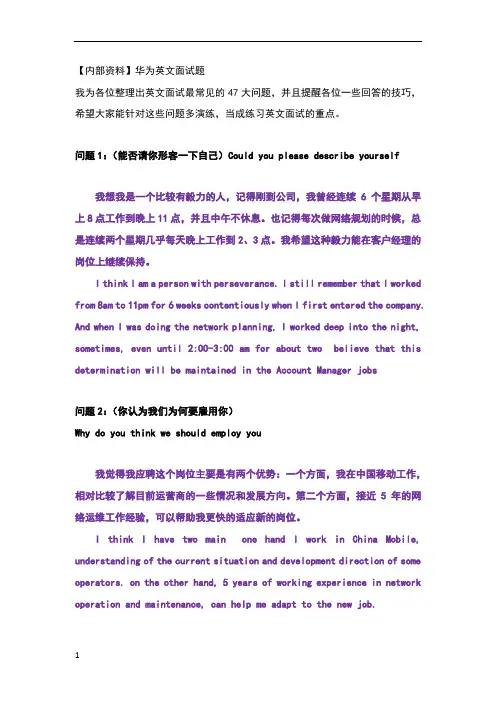
【内部资料】华为英文面试题我为各位整理出英文面试最常见的47大问题,并且提醒各位一些回答的技巧,希望大家能针对这些问题多演练,当成练习英文面试的重点。
问题1:(能否请你形容一下自己)Could you please describe yourself我想我是一个比较有毅力的人,记得刚到公司,我曾经连续6个星期从早上8点工作到晚上11点,并且中午不休息。
也记得每次做网络规划的时候,总是连续两个星期几乎每天晚上工作到2、3点。
我希望这种毅力能在客户经理的岗位上继续保持。
I think I am a person with perseverance. I still remember that I worked from 8am to 11pm for 6 weeks contentiously when I first entered the company. And when I was doing the network planning, I worked deep into the night, sometimes, even until 2:00-3:00 am for about two believe that this determination will be maintained in the Account Manager jobs问题2:(你认为我们为何要雇用你)Why do you think we should employ you我觉得我应聘这个岗位主要是有两个优势:一个方面,我在中国移动工作,相对比较了解目前运营商的一些情况和发展方向。
第二个方面,接近5年的网络运维工作经验,可以帮助我更快的适应新的岗位。
I think I have two main one hand I work in China Mobile, understanding of the current situation and development direction of some operators. on the other hand, 5 years of working experience in network operation and maintenance, can help me adapt to the new job.问题3:(你自认自己最大的优劣势分别为何)What do you think are your greatest strengths and weaknesses我想我的劣势是技术出身而非市场出身。
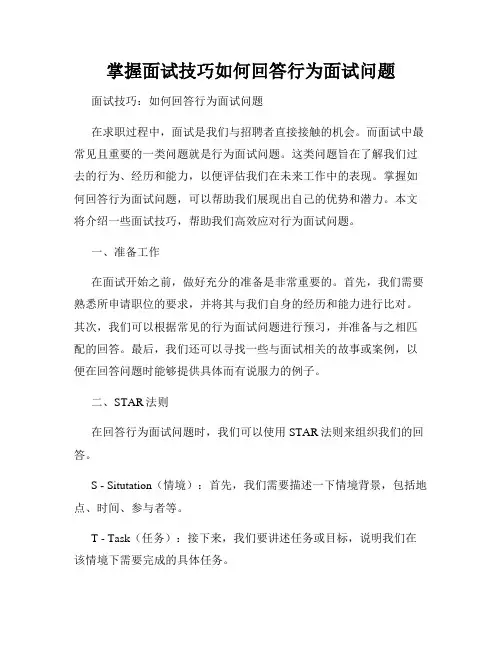
掌握面试技巧如何回答行为面试问题面试技巧:如何回答行为面试问题在求职过程中,面试是我们与招聘者直接接触的机会。
而面试中最常见且重要的一类问题就是行为面试问题。
这类问题旨在了解我们过去的行为、经历和能力,以便评估我们在未来工作中的表现。
掌握如何回答行为面试问题,可以帮助我们展现出自己的优势和潜力。
本文将介绍一些面试技巧,帮助我们高效应对行为面试问题。
一、准备工作在面试开始之前,做好充分的准备是非常重要的。
首先,我们需要熟悉所申请职位的要求,并将其与我们自身的经历和能力进行比对。
其次,我们可以根据常见的行为面试问题进行预习,并准备与之相匹配的回答。
最后,我们还可以寻找一些与面试相关的故事或案例,以便在回答问题时能够提供具体而有说服力的例子。
二、STAR法则在回答行为面试问题时,我们可以使用STAR法则来组织我们的回答。
S - Situtation(情境):首先,我们需要描述一下情境背景,包括地点、时间、参与者等。
T - Task(任务):接下来,我们要讲述任务或目标,说明我们在该情境下需要完成的具体任务。
A - Action(行动):然后,我们要介绍我们采取的具体行动和策略,包括我们所做的决策和解决问题的方式。
R - Result(结果):最后,我们要描述我们采取行动后的结果,并强调我们的贡献和取得的成就。
通过使用STAR法则,我们可以有条理地回答行为面试问题,使回答更加具体和清晰。
三、示例回答以下是一些常见的行为面试问题以及示例回答,供参考:1. "请告诉我们一个你面临过的挑战,以及你是如何应对的?"回答:我曾在团队项目中遇到过成员之间沟通不畅的挑战。
在这种情况下,我主动担任起沟通的桥梁角色,组织团队开展定期会议,鼓励大家分享意见和解决问题。
通过我的努力,团队成员之间的沟通得到了改善,项目也顺利完成。
2. "请分享一个你在工作中取得的最大成功?"回答:在我上一家公司中,我带领团队成功开发了一款新产品。
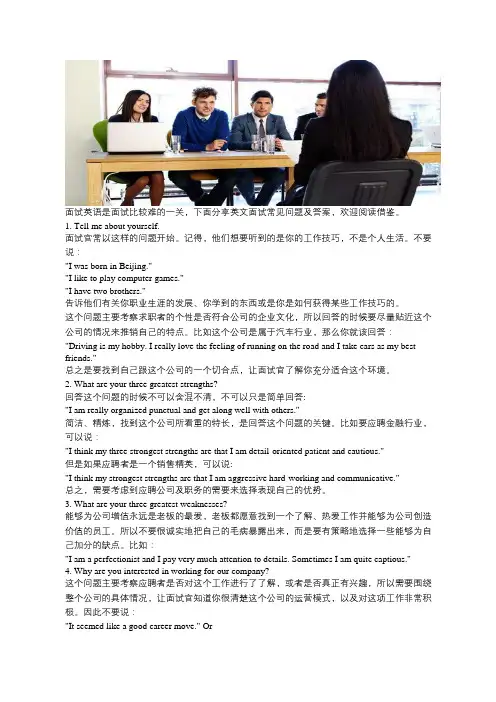
面试英语是面试比较难的一关,下面分享英文面试常见问题及答案,欢迎阅读借鉴。
1. Tell me about yourself.面试官常以这样的问题开始。
记得,他们想要听到的是你的工作技巧,不是个人生活。
不要说:"I was born in Beijing.""I like to play computer games.""I have two brothers."告诉他们有关你职业生涯的发展、你学到的东西或是你是如何获得某些工作技巧的。
这个问题主要考察求职者的个性是否符合公司的企业文化,所以回答的时候要尽量贴近这个公司的情况来推销自己的特点。
比如这个公司是属于汽车行业,那么你就该回答:"Driving is my hobby. I really love the feeling of running on the road and I take cars as my best friends."总之是要找到自己跟这个公司的一个切合点,让面试官了解你充分适合这个环境。
2. What are your three greatest strengths?回答这个问题的时候不可以含混不清,不可以只是简单回答:"I am really organized punctual and get along well with others."简洁、精炼,找到这个公司所看重的特长,是回答这个问题的关键。
比如要应聘金融行业,可以说:"I think my three strongest strengths are that I am detail-oriented patient and cautious."但是如果应聘者是一个销售精英,可以说:"I think my strongest strengths are that I am aggressive hard-working and communicative."总之,需要考虑到应聘公司及职务的需要来选择表现自己的优势。
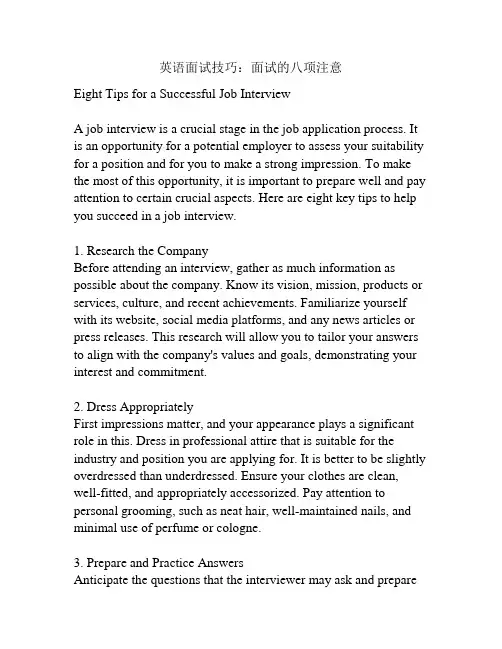
英语面试技巧:面试的八项注意Eight Tips for a Successful Job InterviewA job interview is a crucial stage in the job application process. It is an opportunity for a potential employer to assess your suitability for a position and for you to make a strong impression. To make the most of this opportunity, it is important to prepare well and pay attention to certain crucial aspects. Here are eight key tips to help you succeed in a job interview.1. Research the CompanyBefore attending an interview, gather as much information as possible about the company. Know its vision, mission, products or services, culture, and recent achievements. Familiarize yourself with its website, social media platforms, and any news articles or press releases. This research will allow you to tailor your answers to align with the company's values and goals, demonstrating your interest and commitment.2. Dress AppropriatelyFirst impressions matter, and your appearance plays a significant role in this. Dress in professional attire that is suitable for the industry and position you are applying for. It is better to be slightly overdressed than underdressed. Ensure your clothes are clean, well-fitted, and appropriately accessorized. Pay attention to personal grooming, such as neat hair, well-maintained nails, and minimal use of perfume or cologne.3. Prepare and Practice AnswersAnticipate the questions that the interviewer may ask and preparethoughtful and concise answers. Focus on highlighting your skills, experiences, and achievements that are relevant to the position. Practice speaking clearly and confidently in front of a mirror or with a friend or family member. Remember to maintain good eye contact and speak in a calm and composed manner during the actual interview.4. Be PunctualArrive at least 15 minutes early for the interview. Being punctual not only displays your professionalism but also allows you to settle down, calmly gather your thoughts, and make any final preparations. Plan your route in advance, considering potential traffic or public transportation delays. If unforeseen circumstances arise and you are unable to arrive on time, make sure to inform the interviewer as soon as possible.5. Demonstrate Good Body LanguageBody language can speak louder than words. During the interview, sit up straight, maintain good posture, and avoid slouching. Show enthusiasm and engagement by nodding and maintaining eye contact with the interviewer. A firm handshake and a friendly, confident smile are also important for making a positive first impression. Avoid fidgeting or crossing your arms, as these can convey nervousness or defensiveness.6. Ask QuestionsAn interview is not just an opportunity for the employer to evaluate you, but also for you to assess whether the company is the right fit for you. Prepare a list of intelligent questions about the role, the company's future plans, opportunities for growth, or thecompany culture. Asking relevant and insightful questions shows your genuine interest and engagement. It also helps you gather important information to make an informed decision if an offer is extended to you.7. Highlight Your Soft SkillsApart from technical skills, employers also value soft skills, such as communication, teamwork, problem-solving, and leadership abilities. Use examples from your past experiences to highlight your proficiency in these areas. Emphasize your ability to adapt to different situations, work well with others, and handle challenges. Soft skills are often what distinguishes a great candidate from a good one.8. Follow Up with a Thank-You NoteAfter the interview, send a thank-you note to the interviewer or interview panel within 24 hours. Express your gratitude for the opportunity to interview and reiterate your interest in the position. It is also an opportunity to briefly summarize your strengths and why you are a good fit for the role. This gesture shows professionalism and leaves a positive lasting impression.In conclusion, excelling in a job interview requires thorough preparation and attention to detail. By researching the company, dressing appropriately, practicing answers, being punctual, demonstrating good body language, asking questions, highlighting your soft skills, and following up with a thank-you note, you will significantly increase your chances of success. Remember, an interview is an opportunity to showcase your potential and convince the employer that you are the best candidate for thejob.Tips for a Successful Job Interview: A Comprehensive GuideIn today's competitive job market, a successful job interview is the key to landing your dream position. It is an opportunity to showcase your skills, experiences, and unique qualities to potential employers. To help you ace your next job interview, here is a comprehensive guide with additional tips and strategies.9. Understand the Job DescriptionBefore going into an interview, thoroughly understand the job description and the requirements of the role. This will allow you to align your skills and experiences with the needs of the company. Take note of any specific skills or qualifications mentioned and prepare examples of how you have utilized these in your past work experiences. By demonstrating a deep understanding of the job, you show your dedication and enthusiasm for the role.10. Practice Active ListeningDuring the interview, actively listen to the interviewer's questions and respond thoughtfully. Avoid interrupting or completing their sentences. Take a moment to comprehend the question and gather your thoughts before answering. Active listening helps you demonstrate your attention to detail, comprehension skills, and ability to analyze information. It also allows you to provide more specific and relevant responses.11. Show EnthusiasmTo make a lasting impression, show genuine enthusiasm for the position and the company. Let your passion shine through your words and body language. Express your excitement about theopportunity to contribute to the company's success and how the role aligns with your long-term career goals. Employers are more likely to hire candidates who are enthusiastic, as they tend to be more motivated and driven.12. Be AuthenticWhile it is important to present yourself in the best possible way, it is equally important to be authentic and true to yourself. Employers want to hire individuals who are genuine and can bring their authentic selves to the workplace. Avoid exaggerating or lying about your experiences or skills. Instead, focus on highlighting your genuine strengths and qualities. It is better to be honest and transparent about areas where you may need further development or learning.13. Showcase Problem-Solving SkillsEmployers are always looking for candidates who can think critically and solve complex problems. Prepare examples of situations where you faced challenges or difficult decisions and successfully resolved them. Highlight your analytical thinking, creativity, and ability to work under pressure. Problem-solving skills demonstrate your ability to handle unforeseen circumstances and contribute to the growth and success of the company.14. Be Prepared for Behavioral QuestionsBehavioral questions are commonly asked in interviews to assess your past behaviors and how they relate to the key competencies required for the role. These questions often begin with phrases such as "Tell me about a time when..." or "Give me an example of..." Prepare specific examples from your past experiences thatshowcase your problem-solving skills, communication abilities, leadership qualities, and teamwork accomplishments.15. Utilize the STAR methodWhen answering behavioral questions, use the STAR method to structure your responses effectively. STAR stands for Situation, Task, Action, and Result. Begin by describing the situation or task you encountered, explain the actions you took to address the situation, and conclude with the positive results achieved. This method allows you to provide a complete and concise answer while highlighting your specific contributions and achievements. 16. Be Mindful of Non-Verbal CommunicationRemember that your body language speaks volumes during an interview. Maintain good posture, make eye contact, and use confident hand gestures when appropriate. A warm and genuine smile can help build rapport with the interviewer. Be aware of your facial expressions, and try to convey a positive and engaged demeanor throughout the interview. Non-verbal communication should align with your verbal responses, illustrating your overall professionalism and confidence.17. Handle Difficult Questions with GraceInterviewers may ask challenging or unexpected questions to assess your ability to handle pressure and think on your feet. Stay calm, take a moment to gather your thoughts, and respond tactfully. If you are asked a question you do not know the answer to, be honest and admit that you are unsure. Offer to provide further information or research on the topic after the interview. Handling difficult questions with grace demonstrates your integrity andhumility.18. Research Current Industry TrendsKeep yourself up to date with the latest trends, news, and developments in the industry you are applying for. This shows your passion for the field and your commitment to continuous learning and growth. Be prepared to discuss any industry-specific challenges or opportunities and how you can contribute to the company's success by staying ahead of the curve.19. Practice Mindfulness and Relaxation Techniques Nervousness is natural before an interview, but it is important to manage your anxiety and present yourself confidently. Practice mindfulness and relaxation techniques, such as deep breathing exercises, meditation, or visualization, to calm your nerves and stay focused. Remember to take breaks and engage in activities that help reduce stress before the interview day.20. Follow Up with Professional ReferencesIf the interviewer requests professional references, ensure you have a list of relevant and updated references available. Notify your references in advance, providing them with details about the job position and the company, so they can be prepared if contacted. Be sure to thank them for their support and maintain a professional relationship with them.21. Learn from Each Interview ExperienceRegardless of the outcome, treat every interview as a valuable learning experience. Reflect on your performance, both strengths and areas for improvement. Identify any gaps in your skills orknowledge and work on developing them for future interviews. Keep a record of the questions asked and your responses to help you better prepare for similar questions in the future.22. Don't Give UpEven if you are not successful in securing a job offer from a particular interview, don't give up. Stay positive, continue to improve your skills and experiences, and persist in your job search. Each interview is an opportunity to learn and grow, bringing you one step closer to finding the right job.In conclusion, a successful job interview requires thorough preparation, effective communication, and the ability to showcase your unique qualities. By understanding the job description, actively listening, showing enthusiasm, being authentic, highlighting problem-solving skills, utilizing the STAR method, managing non-verbal communication, handling difficult questions, keeping up with industry trends, practicing mindfulness, utilizing professional references, learning from each interview experience, and staying persistent, you can maximize your chances of success. Remember, each interview is a stepping stone toward your future career, and every interaction is an opportunity to shine.。
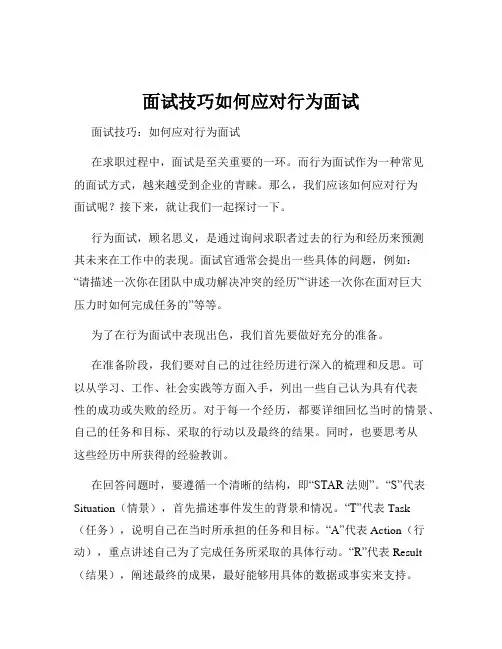
面试技巧如何应对行为面试面试技巧:如何应对行为面试在求职过程中,面试是至关重要的一环。
而行为面试作为一种常见的面试方式,越来越受到企业的青睐。
那么,我们应该如何应对行为面试呢?接下来,就让我们一起探讨一下。
行为面试,顾名思义,是通过询问求职者过去的行为和经历来预测其未来在工作中的表现。
面试官通常会提出一些具体的问题,例如:“请描述一次你在团队中成功解决冲突的经历”“讲述一次你在面对巨大压力时如何完成任务的”等等。
为了在行为面试中表现出色,我们首先要做好充分的准备。
在准备阶段,我们要对自己的过往经历进行深入的梳理和反思。
可以从学习、工作、社会实践等方面入手,列出一些自己认为具有代表性的成功或失败的经历。
对于每一个经历,都要详细回忆当时的情景、自己的任务和目标、采取的行动以及最终的结果。
同时,也要思考从这些经历中所获得的经验教训。
在回答问题时,要遵循一个清晰的结构,即“STAR 法则”。
“S”代表Situation(情景),首先描述事件发生的背景和情况。
“T”代表 Task(任务),说明自己在当时所承担的任务和目标。
“A”代表 Action(行动),重点讲述自己为了完成任务所采取的具体行动。
“R”代表 Result (结果),阐述最终的成果,最好能够用具体的数据或事实来支持。
例如,当被问到“请描述一次你成功领导团队完成项目的经历”时,你可以这样回答:“Situation:在去年,我所在的公司接到了一个重要的项目,时间紧迫,任务艰巨。
我们的团队由来自不同部门的成员组成,彼此之间不太熟悉,沟通和协调存在一定的困难。
Task:我的任务是带领这个团队在一个月内完成这个项目,并且要保证质量达到客户的要求。
Action:首先,我组织了一次团队会议,让大家互相了解,明确各自的职责和分工。
在项目进行过程中,我定期与团队成员进行沟通,及时解决他们遇到的问题。
同时,我也积极与其他部门协调资源,确保项目的顺利进行。
当遇到一些技术难题时,我组织大家一起讨论,共同寻找解决方案。
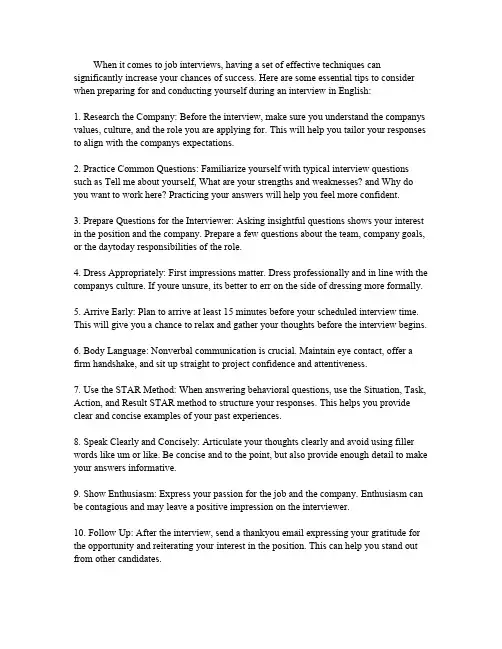
When it comes to job interviews,having a set of effective techniques can significantly increase your chances of success.Here are some essential tips to consider when preparing for and conducting yourself during an interview in English:1.Research the Company:Before the interview,make sure you understand the companys values,culture,and the role you are applying for.This will help you tailor your responses to align with the companys expectations.2.Practice Common Questions:Familiarize yourself with typical interview questions such as Tell me about yourself,What are your strengths and weaknesses?and Why do you want to work here?Practicing your answers will help you feel more confident.3.Prepare Questions for the Interviewer:Asking insightful questions shows your interest in the position and the company.Prepare a few questions about the team,company goals, or the daytoday responsibilities of the role.4.Dress Appropriately:First impressions matter.Dress professionally and in line with the companys culture.If youre unsure,its better to err on the side of dressing more formally.5.Arrive Early:Plan to arrive at least15minutes before your scheduled interview time. This will give you a chance to relax and gather your thoughts before the interview begins.6.Body Language:Nonverbal communication is crucial.Maintain eye contact,offer a firm handshake,and sit up straight to project confidence and attentiveness.e the STAR Method:When answering behavioral questions,use the Situation,Task, Action,and Result STAR method to structure your responses.This helps you provide clear and concise examples of your past experiences.8.Speak Clearly and Concisely:Articulate your thoughts clearly and avoid using filler words like um or like.Be concise and to the point,but also provide enough detail to make your answers informative.9.Show Enthusiasm:Express your passion for the job and the company.Enthusiasm can be contagious and may leave a positive impression on the interviewer.10.Follow Up:After the interview,send a thankyou email expressing your gratitude for the opportunity and reiterating your interest in the position.This can help you stand out from other candidates.11.Reflect and Improve:Regardless of the outcome,reflect on your performance and identify areas for improvement.This will help you prepare better for future interviews.nguage Proficiency:Since the interview is in English,ensure your language skills are up to par.Practice speaking English fluently and idiomatically to avoid any communication barriers.By incorporating these tips into your interview preparation,you can increase your confidence and improve your performance,leading to a higher likelihood of securing the job.Remember,every interview is a learning experience,so use each opportunity to refine your skills and approach.。
The correct answer to the word crisis is danger and opportunity, but most people only see danger, and few see opportunities, so not many people have successfully made big money.同学互助一起进步(WORD文档/A4打印/可编辑/页眉可删)大型企业面试技巧大型企业面试常见问题面试在如今的求职环节中起到越来越重要的作用,一些大型企业逐渐降低笔试题目的难度和数量,而大幅增加了面试题目的难度和数量。
一个人即使实力超群,如果在面试之前不进行充分的准备,也还是有可能使自已狼狈不堪。
因此充分准备是顺利通过面试的重要保障。
结合世界500强公司和中国大型国企的常见面试问题,我们汇总了20个中英文常见问题,建议大家仔细研究和练习:1.“Tell me about youeself.”简要介绍你自已.2.“Why are you interested in this position?”你为什么对份工作感兴趣?3.“what ate yonr strengths?”谈谈你的优势.4.“What are your strengths?”你最大的弱点是什么?.5.“Why do you feel you are right for this position?”为什么你认为自已适合这个职位.6.“Can you give me the hiqhlights of your resume?”谈谈你的简历上有些什么值得特别关注的吗?7.“What are your interests?”你有哪些兴趣爱好?8.“Tell me how your friends/family would de-scribe you?”你的朋友或者家人会怎样评价你?9.“Whst motivates you to succeed?”你争取成功的动力是什么?10.“What qualities do you feel are important to be successful iu—(i. e. customer service)?”哪些品质在你看来对(客户服务工作)成功是最重要的?11.“What previous experience has helped you develop these qualities?”之前哪些的经历帮助你获得了这些品质?12.“What was your greatest challenge and howdid you overcome it ?”你经历过的最大挑战是什么?你是如何跨越它的`?13.“What was your greatest accomplishment in the past?”在过去的日子里,你觉得自已最大的成就是什么?14.“How do you prioritize when you are given too many tasks to accomplesh?”你怎样在一堆根本做不完的工作中区分轻重缓急?15.“Tell me about agoal you set for yourself and how you accomplished it?”你给自已设定过什么目标?你是如何实现它的?16.“Do you typically achieve what you set out to do ?”你是否通常能达成自已的目标?17.“What do you do if you totally disagree with arequest made by your manager?”如果你完全不同意你上司的某个要求,你怎么处理?18.“Can you give me an example of teamworek and leadership?”你能向我举一个团队活动和领导力的例子吗?19.“When in a group setting what is your typical role?”你在团队中通常的作用是什么?20.“How do you motivate a team to succeed?”你如何激励团队达到成功?。
面试英语:大公司“行为面试”应对技巧 一提到面试总觉得有点胆战心惊(terrifying),而之所以胆战心惊是因为无法预料(hard to predict)面试官要提什么样的问题。通常情况下(more often than not),面试官喜欢挖掘一些候选人过去的经历(past experiences),如果没有事前准备好相关内容来应对(cope with)的话,面试时只会从头到尾都结结巴巴(tongue-tied)。
在面试中,行为类面试题(behavioral interview questions)是最热门的话题(hot Items)。那么,什么是行为类面试题呢?此类面试题的目的是为了了解候选人过去的举动(behaved in the past)。通过这方面的了解,面试官可以预知候选人未来的工作情况。毕竟每个面试官都希望寻找到一个可以在公司发光发热的最佳人选。
你可能曾被问到过以下问题: 描述一下你们团队或公司曾经历过的变革(undergoing some changes)。这些改变是如何影响(impact)你的,你是如何适应的(adapt to)?
可否谈谈你所管理的一个长期项目(a long-term project)?你是如何及时地让事情按期进展的(moving along in a timely manner)?
举个列子讲述一个没有满足客户要求的经历(not meet a client’s expectation)。是如何发生的,你是如何挽救这一局面的(rectify the situation)? 以上提问的方式可能各有不同,但大致简而言之为(can be reduced to) “举个例子说说/谈谈…的时候”这个形式的问题。
行为类问题的分类(categories) 根据(based on)面试官的经验,可以分为以下几个类型:
1. 团队合作(Teamwork) 面试中有关团队合作的问题是最常见的。面试官提这类问题是想了解候选人是否具有良好的团队精神(a good team player),毕竟(after all)这类能力在工作中非常重要。
常见问题举例: 请举例说说你是如何和性格完全不同的同事一起紧密合作的(work closely with someone with a personality which was very different from yours)?
请告诉我你如何面对团队合作时出现的矛盾(face a conflict while working on a team)?是如何处理好的?
你是否尝试过从某个不是有求必应的(not responsive)同事那里获取信息? 面试官的期望: 举一到两个相关的列子(relevant examples)说明(demonstrating)你可以和其它组员一起良好合作。
面试的终极目标(ultimate goal)是要证明自己非常平易近人,可以很愉快地与他人合作。
要了解工作要求中“团队合作”的定义。比如,刚刚起步的公司(a start-up company)比较喜欢寻找一些可以在团队中扮演不同角色的员工。跨国公司(a multinational company)则比较喜欢寻找一些可以迅速适应(adapt quickly to)工作环境(working environment)的新人(newcomers)。
为了(In order to)展现自己的合作能力(cooperativeness),候选人应该多谈谈自己帮助团队成功的经历,而不是过多地强调(emphasize on)个人成就(individual’s success)。
要尊重前组员(teammates),而不是一味地抱怨和批评(raising complaint or criticism)。 谈谈自己相关的能力和素质,比如懂得倾听,可靠(reliability),尊重他人,做事及时(timeliness)等等。
2. 解决问题(Problem Solving) 除团队合作能力外,面试官还比较注重解决问题的能力。这类问题旨在了解候选人是否可以在未来的工作中顺利地处理问题(manage problems smoothly)。
常见问题举例: 请举例说说你的公司曾经历过的变革。你是如何适应的? 请举例说说你曾遇到(encounter)的最具挑战的工作。你是如何处理的? 请说说你是如何与一个不好相处的同事一起工作的? 面试官的期望:
当回答这类问题时应该举一些列子证明你可以用策略来解决问题。 对于这类问题应该谈的是专业上遇到的问题(professional matters),而不是任意一件日常杂事(arbitrary daily chores)。
除列举具体问题(concrete problem)外还应该谈谈如何处理问题(approach the problem)。
通过谈论如何解决问题来证明自己优秀的问题处理能力和批判性思考能力(critical thinking)。
不应过多强调自己的成就(accomplishments),应该保持谦虚(remain humble),向面试官表述自己每次解决问题后的成长之处。
3. 动机和价值观(Motivation and Value) 面试的目的就是要明确候选人进入公司的动机是什么,所以这类问题也十分常见。然而大多数情况下面试官并不会直截了当地问,而常常(very often)以比较随意(random )隐晦的形式来提问。
常见问题举例: 谈谈你努力工作实现目标的经历 谈谈你努力尝试帮助别人的经历。 谈谈你努力尝试培养新兴趣的经历(learn a new hobby)。 面试官的期望:
好好处理出乎意料的问题(unexpected questions),建议在想出答案(come up with an answer)之前先对面试官展现从容的微笑。
因为这些问题看起来是比较随意的,所以在回答前要明确这些问题的要点,也就是“动机”。
这类问题无需固定的正确答案(a solid right answer),也没有所谓的正确答案,只要可以热情清晰地回应(give an enthusiastic and coherent response)面试官,那就无所谓是什么内容。
4. 失败(Failure) 这类问题应该算是所有面试题目中最困难的一个了。之所以说难,是因为回答的时候要注意技巧。面试官也正是想考验候选人是否能够在不损害形象(without tarnishing)的情况下说明自己过去的失败经历。要记住,面试官之所以提这类问题是为了:一、了解候选人在工作中的表现。二、候选人从失败中吸取了什么教训(learn from failure)。
常见问题举例: 直截了当式(blunt): 谈谈你的失败经历。 隐晦式(implicit):
谈谈你面临过的压力。 谈谈你在领导团队时遇到的困难。 谈谈你是如何面对沟通障碍(communication break-down) 面试官的期望: 要坦诚叙述失败的经历。 形容失败经历时要保留积极部分。 谦虚地承认错误(humbly admit the fault),而不是一味地指责他人(blaming others),或否定失败(denying the failure)。
多谈论自己在处理失败的过程中所获得的素质和能力(the qualities and skills they obtained out of handling the failure)。
避免谈论一些不利的(detrimental)失败经历,表明上一份工作的失败对未来工作的影响不大。
最好谈谈自己对成功和失败的概念。 5. 成就(Achievement) 简单地看,面试官通过这类问题来了解候选人的才能(talents)。其实更重要的是想知道候选人是如何看待成功,以及未来的目标如何设定等等。
常见问题举例: 你可以谈谈是如何成功地指挥一个项目(lead a project)的吗? 你最近最大的成就(biggest achievement)是什么? 面试官的期望:
详细地说明(Specify)一个到几个成就来证明自己的能力。 应该避免过多地详述(overly specific)自己的成就,否则听起来像是在吹嘘(appear to be boasting)自己一样。
最好可以详述(elaborate on)帮助自己实现目标(accomplish goal)的策略。 “Align past achievements with the job you are applying for”——将过去的成就与所申请的工作联系起来。
回答的末尾最好能把过去的成就与未来联系起来,比如未来想要实现的目标之类。 最后要把自己的未来计划(future plan)与所申请的工作联系起来,也就是要告知面试官这份工作是自己人生计划中的一部分。
文章最后给大家分享一些英语外教课,来自乐知英语。如果你面试的是一家外企,在语言学习上也不要有惰性,工作之余,别忘记充电,投资自己的未来,迟早会有收获。以下是乐知的免费试听课:
听课地址>>>http://www.hiknow.com/sessionhall.html?uid=sophie